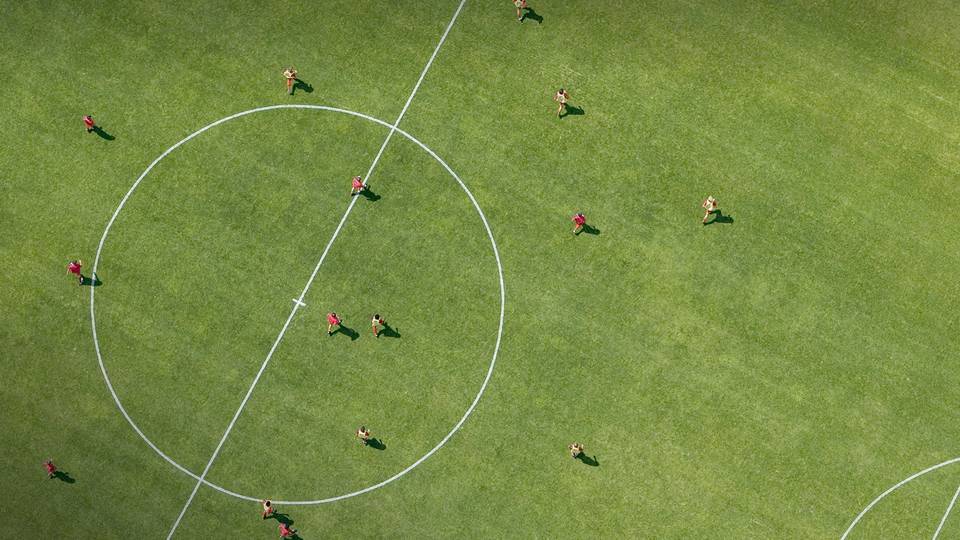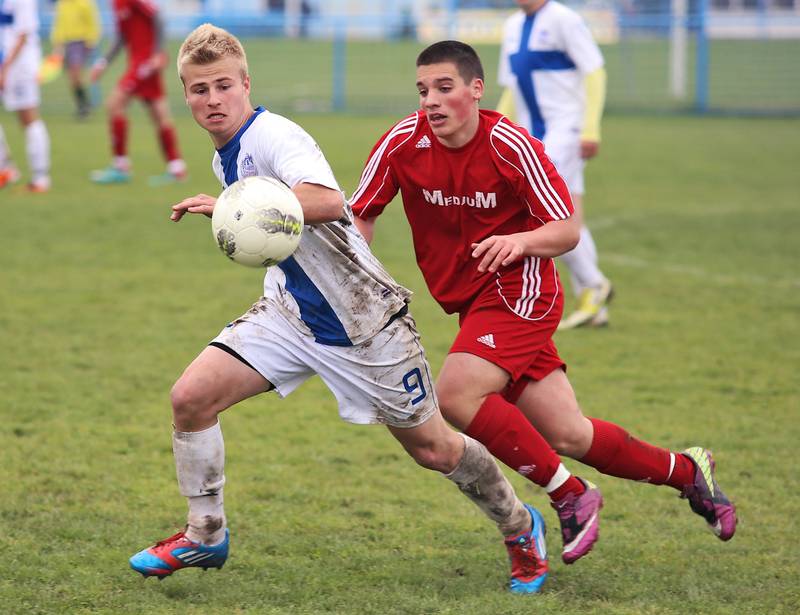Youth football at the U14 level represents a crucial developmental stage for young players across the UK. Regional and community organisations provide structured environments for these adolescent footballers to hone their skills while learning valuable life lessons about teamwork and discipline. Well-organised U14 football programmes focus on technical skill development while balancing competitive play with player enjoyment and long-term athletic development.
Grassroots football organisations supporting U14 teams operate within larger league structures, offering regular fixtures, tournaments and development opportunities for players aged 13-14. Many of these organisations rely on volunteer coaches and parents to sustain their operations, creating community hubs where young footballers can thrive regardless of ability level. The structured approach of these programmes helps bridge the gap between primary school football and the more demanding secondary school environment.
For coaches and organisers working with U14 teams, effective management systems are essential for tracking player progress, organising fixtures, and maintaining communication with parents. While some might still use the term "soccer" in certain contexts, the focus remains on delivering quality football experiences that nurture talent while ensuring young people develop a lifelong love for the sport. Modern tools allow coaches to track player statistics and team performance, helping them identify areas for improvement throughout the season.
Fundamentals of U14 Football Organisation
Effective organisation of U14 football requires careful consideration of structure, age requirements, and proper coaching methodologies. These elements form the foundation for developing young players while ensuring competitions remain fair and developmentally appropriate.
Structure and Regulations
U14 football leagues typically follow a structured format designed to balance competitive play with player development. Most regional football associations establish specific regulations governing match duration, pitch dimensions, and ball size for this age group. Standard matches typically last 70-80 minutes with a size 4 or 5 ball, depending on local guidelines.
Registration deadlines are crucial and usually fall several weeks before seasons commence. Teams must submit required documentation including proof of player eligibility and coach qualifications.
Substitution rules often differ from adult football, with many U14 competitions allowing rolling substitutions to maximise participation. This approach ensures all squad members receive adequate playing time.
Disciplinary procedures also differ from senior football, with an emphasis on education rather than punishment for younger players.
Age Categories and Participant Eligibility
U14 football encompasses players who are under 14 years of age at the start of the relevant season. The exact cutoff date varies by country and competition, but in the UK this typically means players must be under 14 as of August 31st.
Birth certificate verification is standard practice during registration to prevent age-related discrepancies. Many leagues implement strict verification processes to maintain fair competition.
Mixed-gender participation policies vary by region. Some associations permit mixed teams until age 14, while others establish separate boys' and girls' competitions earlier.
Playing up or down age groups may be permitted in exceptional circumstances, though this requires special approval. These exceptions typically consider both physical development and skill level to ensure player safety.
Role of Coaches and Trainers
Qualified coaches are essential in U14 football, with most leagues requiring minimum certification levels. The FA Level 1 coaching qualification is typically the baseline requirement, though higher levels are encouraged.
Coaches at this level must balance tactical development with technical skills. Training sessions should incorporate both structured drills and game situations that mimic match conditions. The soccer curriculum at this age typically emphasises positional understanding and tactical awareness.
Safeguarding responsibilities represent a critical aspect of the coaching role. All adults involved must complete background checks and safeguarding courses before working with youth athletes.
Regular coach education through workshops and mentoring programmes helps ensure consistent development philosophies across teams. These educational opportunities allow coaches to share best practices and remain current with evolving coaching methodologies.
Major U14 Football Competitions
Youth football competitions for under-14 players provide crucial development opportunities and competitive experiences. These tournaments help young players build technical skills while fostering teamwork and international understanding.
Domestic Youth Football Leagues
In the UK, U14 leagues operate at both grassroots and elite levels. Most counties run their own competitions through local football associations, providing regular weekend matches for young players.
Premier clubs often have academy teams competing in the U14 Elite Development Programme, where future professionals hone their skills.
These domestic competitions follow standardised formats with autumn-spring seasons. Matches typically feature 11-a-side games on appropriate-sized pitches with modified rules to encourage development.
Many grassroots leagues utilise teamstats.net for fixture management and performance tracking, giving coaches valuable insights into player development.
International Youth Football Tournaments
International tournaments offer U14 teams exposure to different playing styles and cultures. The Greenport International U14 Tournament in the Netherlands represents one prominent example, with Atlanta United's U14 squad participating in its ninth edition.
Other notable European competitions include the Barcelona Youth Cup and the Gothia Cup in Sweden. These events attract teams from multiple continents, creating truly global experiences.
Tournament formats typically feature group stages followed by knockout rounds over 3-5 days. Many competitions incorporate cultural activities alongside matches.
For UK teams, European tournaments provide valuable development opportunities beyond domestic competition. Spring and summer holidays see numerous clubs travelling to continental events.
Tokyo U-14 International Youth Football Tournament
The Tokyo U-14 International Youth Football Tournament stands as one of Asia's premier youth competitions. Established in 2003, this prestigious event attracts elite academy teams from Japan, Europe, South America and Australia.
Held annually in early August, the tournament features intensive competition over six days. Matches take place at the Japan Football Association's national training centre and surrounding Tokyo venues.
The competition's structure includes group play followed by championship and plate knockout phases. Former participants who later became professionals include several current Premier League stars.
Beyond competition, the tournament emphasises cultural exchange with organised visits to historical sites and interaction between teams from different nations.
Role of the Japan Football Association
The Japan Football Association (JFA) leads youth development through comprehensive tournament organisation and standardised coaching programmes. Their commitment to U14 football reflects the importance of this age group in player development.
The JFA sanctions approximately 40 youth tournaments annually across various age groups. Their technical committee establishes specific competition rules to promote skill development rather than physical dominance.
Japanese youth football emphasises technical ability and tactical understanding, qualities evident in their national teams. The JFA provides detailed resources for coaches focusing on the U14 age group.
Their "Golden Age Project" specifically targets U12-U14 players, recognising this period as crucial for technical development. Many European clubs now study Japanese youth development models for their effectiveness in producing technically proficient players.
Organising a U14 Football Event
Successful U14 football events require careful planning across venue selection, promotional strategies, and community involvement. Attention to safety, accessibility, and engaging the right audiences can significantly impact the success of your tournament or match day.
Venue Selection for Safety and Accessibility
When selecting a venue for a U14 football event, prioritise safety and accessibility above all else. Choose locations with proper pitch dimensions suitable for the U14 age group, ensuring the playing surface is well-maintained and free from hazards.
Consider facilities with adequate changing rooms, toilets, and shelter in case of poor weather. Many successful youth tournaments have been held at venues like J-Village in Fukushima Prefecture, which offers multiple pitches and excellent supporting amenities.
Ensure the venue has sufficient parking and is accessible by public transport. Check that emergency access points are clear and that first aid facilities are available on-site. Conduct a thorough risk assessment before confirming your booking.
Promoting Events through Social Media
Social media platforms offer powerful tools for promoting U14 football events to the right audiences. Facebook is particularly effective for reaching parents, coaches and local football enthusiasts through community groups and targeted advertisements.
Create an event page with clear details about the tournament format, age restrictions, and registration information. Share regular updates with photos from previous events to build excitement and demonstrate professionalism.
Use appropriate hashtags to increase visibility and encourage participants to share content. Consider creating short video previews showcasing skills from previous tournaments or testimonials from past participants.
Post content at optimal times when your target audience is most active online. Midweek evenings typically generate the highest engagement rates for youth sport promotions.
Engaging Community and Partnerships
Building strong community relationships can transform a simple football event into a memorable community occasion. Approach local businesses for sponsorship opportunities—many are keen to support youth sport initiatives.
Invite local football clubs and schools to participate, offering discounted entry fees for multiple team registrations. Consider using TeamStats.net features to organise fixtures and share real-time updates during the tournament.
Partner with county FAs who can provide valuable resources, referees, and promotional support. They may also help ensure your event meets official guidelines and standards.
Create volunteer opportunities for older youth players or parents who wish to contribute. This builds broader community ownership and provides essential support for running various aspects of the event.
Supporting Youth Talent and Development
The foundation of successful youth football development is built on comprehensive training programs, effective talent identification, and holistic educational support. These elements work together to nurture young footballers through their crucial U-14 developmental stage.
Training Programs and Development Clinics
U-14 training programs focus on technical skill development alongside tactical understanding of the game. Many clubs implement progressive training methodologies that balance fundamental skills with age-appropriate tactical concepts. These sessions typically run 2-3 times weekly, with emphasis on skill repetition and game intelligence.
Football associations across the UK have established standardised development clinics that provide structured learning environments. These clinics often follow long-term player development models, ensuring young athletes receive consistent, quality coaching regardless of their club affiliation.
Development workshops frequently incorporate small-sided games that maximise touches on the ball and decision-making opportunities. Some regions have adopted specialised position-specific training to help players understand role requirements while maintaining overall football literacy.
Scouting and Mentorship Opportunities
Talent identification programs have evolved significantly, moving beyond physical attributes to assess technical ability, game understanding, and psychological factors. Football associations now employ systematic scouting networks that observe players in various competitive contexts rather than isolated trials.
Professional clubs extend mentorship schemes where first-team players connect with U-14 talents, providing guidance and sharing experiences. These relationships prove invaluable for young players navigating their development journey.
Regional talent hubs, similar to those established in Guam's developing soccer structure, create pathways for promising youngsters from grassroots environments. Scouts look for players who demonstrate exceptional technical ability, decision-making capacity, and psychological resilience.
Key scouting criteria:
- Technical proficiency with both feet
- Game intelligence and decision-making
- Physical development potential
- Psychological attributes (determination, focus, coachability)
Educational Support for U-14 Players
Balancing academic commitments with football development remains a crucial component of youth pathways. Forward-thinking clubs implement homework support sessions before or after training to help players manage their dual responsibilities.
Educational workshops covering nutrition, sleep hygiene, and mental wellbeing equip young footballers with knowledge to optimise their development. These sessions often include parent education components, ensuring consistent messaging between home and training environments.
Several academies have established partnerships with local schools to coordinate timetables that accommodate morning training sessions. This approach, pioneered by European clubs, recognises that cognitive development parallels athletic progression during the U-14 phase.
Mental skills training has become increasingly important, with sports psychologists working regularly with youth teams. These professionals help players develop concentration techniques, goal-setting practices, and stress management strategies essential for performance under pressure.












